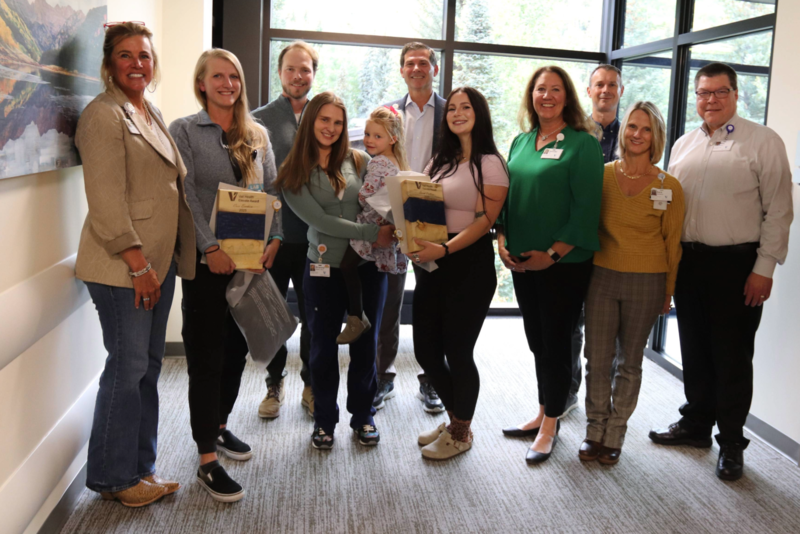News
Get To Know Your Doc: Dr. Michael Glode
Dr. Michael Glode has been practicing medicine for nearly fourdecades now. Six years ago he began working at the Shaw RegionalCancer Center in Edwards once a week and to cover for Dr.Alexander Urquhart when he is away.
"I can't tell the community how lucky they are to have astate-of-the-art medical center right here in the Valley" Glodesaid. "Patients have access to developing therapies and both Drs.(Patricia) Hardenbergh and (Alexander) Urquhart (of the Shaw) arealso clinical assistant professors at CU engaging in research andconstantly bringing the most up-to-date treatments to theirpatients."
Dr. Glode answered a few questions for the Vail Daily.
Vail Daily: Tell us about what you do.
Dr. Michael Glode: I am a prostate cancer specialist and medicaloncologist. I primarily work at UC Denver however I come up toShaw Regional Cancer Center to consult with patients on a weeklybasis and assist facilitating clinical trials.
VD: How did you get into your chosen field.
MG: As a medical student I had an interest in cancer research. Ihave two parents that died of cancer so I am very passionate aboutit. Thirty years ago I was fortunate to get involved with the firstLupron clinical trials and I have been in the lab doing researchas well as conducting clinical trials for three decades now. TheFDA approved three new drugs from the trials conducted atUniversity of Colorado and we have four new drugs in trialpresently.
VD: How are you different than other docs.
MG: I am a very specialized doctor. I focus on Genitourinary (GU)cancers which include bladder testis kidney and prostate. I alsohave more than 30 years of experience specializing in cancerresearch and clinical trials. Staying involved in the lab hasallowed me to keep up with the remarkable explosion in cancerbiology that has characterized the past decade or so.
VD: Tell us a little about your background education andexperience.
MG: I grew up in Chadron Nebraska attended the University ofNebraska followed by medical school at Washington University inSt. Louis and a residency at Parkland Hospital in Dallas. Duringthe Vietnam War I was in the Public Health Service doing researchat the National Institutes of Health followed by oncology trainingat the Dana Farber Cancer Center at Harvard. In 1978 I came to UCColorado learned to ski and have been very fortunate to have arewarding academic career.
VD: What philosophy do you follow in treating your patients?
MG: The patients are in charge of their own destiny my job is toinform them so they can make good decisions. I think of it as "I'mthe coach and they are the player." I support them to achieve theirgoals.
VD: What is the number one thing people should do to behealthy?
MG: Lose weight. Weight relates to cancer and losing weightdecreases chances of prostate cancer.
VD: What are you excited about in the world of medicine rightnow?
MG: In the prostate cancer world the human genome opened the doorto discovery. In general understanding our genes has resulted ingreat things in cancer research and treatment.
More News
-
New!
More

Cass Barham and Sarah Crabtree Honored As Recipients of Vail Health Elevate Award
Cass Barham and Sarah Crabtree, both lab techs at Vail Health Hospital, have been named recipients of the Vail Health Elevate Award. Vail Health created the Elevate Award in June 2022 to give patients and their families an opportunity to nominate and thank employees who have touched their lives in some way.
-
New!
More

What Are the Benefits of Forest Bathing?
The smell of the pine trees. The sounds of birds chirping far off in the distance. The feeling of a cool breeze across skin. The sight of water cascading over a rock. Fully tuning into your senses in nature ignites a deeper awareness and an otherworldly sense of belonging, eliciting a feeling of being connected to something bigger than yourself.
-
New!
More

Myth Busters: Allergy Edition
As a board certified allergist/immunologist practicing for nearly 13 years, I often hear the same questions and concerns from patients. Allergies affect so many of us, whether we’re sniffling and sneezing or worrying about a child's food reaction. But there's a lot of misinformation out there that can make managing allergies confusing and even scary.
